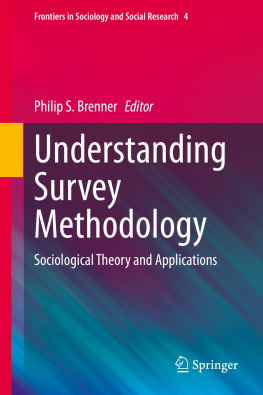ROUTLEDGE LIBRARY EDITIONS:
SOCIAL THEORY
Volume 71
SOCIOLOGICAL THEORY
IN TRANSITION
First published in 1986
This edition first published in 2015
by Routledge
2 Park Square, Milton Park, Abingdon, Oxon, OX14 4RN
and by Routledge
711 Third Avenue, New York, NY 10017
Routledge is an imprint of the Taylor & Francis Group, an informa business
1986 M.L. Wardell and S.P. Turner
All rights reserved. No part of this book may be reprinted or reproduced or utilised in any form or by any electronic, mechanical, or other means, now known or hereafter invented, including photocopying and recording, or in any information storage or retrieval system, without permission in writing from the publishers.
Trademark notice: Product or corporate names may be trademarks or registered trademarks, and are used only for identification and explanation without intent to infringe.
British Library Cataloguing in Publication Data
A catalogue record for this book is available from the British Library
ISBN: 978-0-415-72731-0 (Set)
eISBN: 978-1-315-76997-4 (Set)
ISBN: 978-1-138-78256-3 (Volume 71)
eISBN: 978-1-315-76334-7 (Volume 71)
Publishers Note
The publisher has gone to great lengths to ensure the quality of this reprint but points out that some imperfections in the original copies may be apparent.
Disclaimer
The publisher has made every effort to trace copyright holders and would welcome correspondence from those they have been unable to trace.
This volume M . L. Wardell and S. P. Turner, 1986
This book is copyright under the Berne Convention. No reproduction
without permission. All rights reserved.
Allen & Unwin, Inc.,
8 Winchester Place, Winchester, Mass. 01890, USA
George Allen &. Unwin (Publishers) Ltd,
40 Museum Street, London WC1A 1LU, UK
George Allen Unwin (Publishers) Ltd,
Park Lane, Hemel Hempstead, Herts HP2 4TE, UK
George Allen Unwin Australia Pty Ltd,
8 Napier Street, North Sydney, NSW 2060, Australia
First published in 1986
British Library Cataloguing in Publication Data
Sociological theory in transition.
1. Sociology
I. Wardell, Mark L. II. Turner, Stephen P.
301.01 HM24
ISBN 0-04-301205-1
ISBN 0-04-301206-X Pbk
Set in 10 on 11 point Goudy
by V & M Graphics Ltd, Aylesbury, Bucks
and printed in Great Britain
by Mackays of Chatham
Contents
Mark L. Wardell and Stephen P. Turner
John ONeill
Nico Stehr
Arthur J. Vidich and Stanford M. Lyman
Peter Lassman
Ellsworth R. Fuhrman
David Rubinstein
Scott Lash and John Urry
Barry Hindess
Ted R. Vaughan and Gideon Sjoberg
Alan Sica
Stephen P. Turner and Mark L. Wardell
The quotation from the Bernard Papers is included with the permission of Jessie Bernard and the University of Chicago Library, which we gratefully acknowledge. We are also pleased to express our appreciation for the assistance of Shanti Jayanayagam in the preparation of the manuscript; and to our wives, Hersha Evans-Wardell and Summer Turner.
Derek L. Phillips
In their everyday lives, sociologists often judge various institutional arrangements as good or bad, right or wrong, just or unjust. Further, they discuss, debate, argue and involve themselves in trying to improve the quality of various arrangements. Paradoxically, however, sociology as a discipline is characterized by methodological prohibitions regarding moral commitments and value-judgments. Normative pronouncements by sociologists in their role as scientists are to be strenuously avoided.
This emphasis on value-neutrality is widely shared among sociologists. Insisting that the dichotomy between the is and the ought must be maintained, they claim that only judgments concerning the regularities of empirical phenomena can be true or false, while those judgments pertaining to the normative sphere cannot be considered in this manner. Sociology must be either analytic or empirical and descriptive, but never moral and prescriptive. In a discipline characterized by value-neutrality, then, sociologists are expected to behave as if they were moral skeptics, uncommitted to any specific moral viewpoint. Thus, they stand mute in regard to questions about the most just or humane social organization of society.
Sociologists not only view normative concerns as out of bounds as concerns their own work, they also reject the very possibility of anyone providing answers to questions of a normative nature. Value-judgments are seen as outside the realm of rational inquiry. There is, from this point of view, no way of offering a rational or scientific justification for particular conceptions of right or wrong, good or bad, just or unjust. Like Pascal, who observed that What is truth on one side of the Pyrennes is error on the other, most sociologists believe that normative judgments are not capable of truth or falsity. Thus, questions about the moral standing of a society, or of its political, economic and social institutions, are held to be unanswerable. According to the dominant view in sociology, then, nothing can be said about the justice or injustice of particular patterns of distribution regarding income, housing or health care, or about the legitimacy of one or another political or legal system.
It is probably not surprising that sociologists hold such views about value-judgments and normative theorizing. After all, there was also a long period during which philosophers in the dominant analytic tradition insisted that the normative must be rigidly segregated from the truly philosophical. Ethics, on this reading, was the logical study of the language of morals. The professional philosopher was seen as having no special competence which would allow him or her to make assessments about such things as the justice of a particular institutional arrangement. As was the case in the social sciences, fact and value, description and prescription, were to be strictly separated. Adherence to this rigid dichotomy in philosophy meant, of course, that analytic philosophers were constrained from saying anything at all about concrete moral, social or political issues. Just as in the social sciences, there was a strong commitment to detachment and value-neutrality.
But this earlier agreement between social scientists and analytic philosophers is now a thing of the past. Certainly since the appearance of John Rawlss A Theory of Justice in 1971 and Robert Nozicks Anarchy, State, and Utopia three years later, there has been an increasing number of publications in normative ethics. Rejecting value-neutrality and the dictates of positivism and cultural relativism, many contemporary moral and political philosophers engage in theorizing that is openly normative in character. Thus, Rawls is concerned with the nature and aims of a just society; while Nozick focuses on questions about the nature of the state, its origins and its legitimate functions and justifications. And Ronald Dworkins Taking Rights Seriously (1977) considers the relationship between morality and the law, asking how morality informs and ought to inform a societys legal system. These theorists formulate and defend principles and standards which enable us to evaluate particular existing (and imagined) laws and institutions from a moral standpoint




